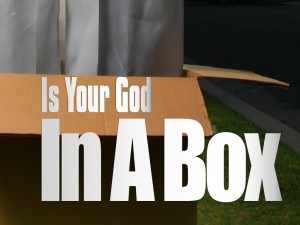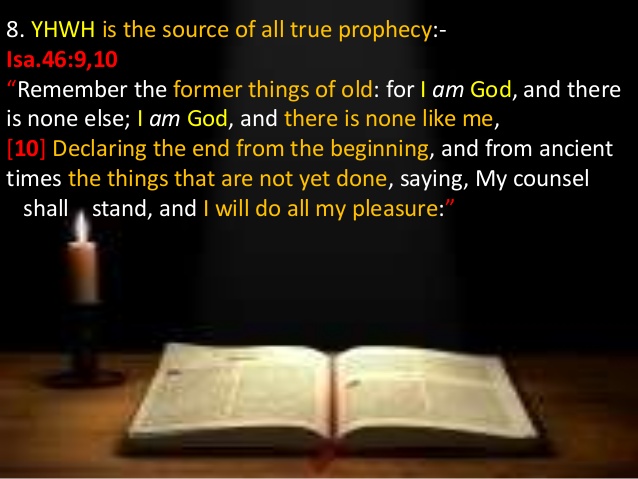[First posted in 2013. This belongs to the series “Quid est veritas?” What is truth? Related posts:
- Pilate: ‘Quid est veritas?’ – Gospel Truth? – 1
- “Quid est Veritas”: Gospel Truth? – 2
- “Quid est veritas?” – Gospel Truth – 3
- Quid est Veritas – 4 – Old Truth, New Truth, Half Truths, All Truth and Nothing But . . .
- Revisit: Quid est veritas?’ – 7 – “YHWH is near to all who call on him, to all who call on him in truth.”
Indeed, who can explain or define God? Only God can reveal Himself and explain what He’s like to humanity. Has He done it? What do you think?—-Admin1.]
———————————-
This is a follow-up article to : Blind Faith vs. Belief based on Evidence where you will read this statement: “The Catholic made his point clear: any time you can explain God, He is no longer God; and any time you can explain faith, it is no longer faith.” In that article we discussed only the definition of faith. Here, we take up the first assertion: “any time you can explain God He is no longer God.”
Quite true, none of us can put God in a box and claim: “this is HE, in this box is everything you need to know about God.” In fact that is in effect the sin of idolatry, when we reduce God to any image of our limited imagination. So then, is God knowable? Or impossible to know? And if so what is the point of even believing He exists? Do we have to settle for “blind faith” on this side of eternity?
In Revelation in a Nutshell, (what does man learn from Natural Revelation?) and GOD’S DOMAIN – The UN-KNOWABLE, we declare our position that without divine revelation, man can only ‘guesstimate’ what God is like. Guess . . . but on what basis?
For one, through Creation, the visible universe, as well as the invisible workings in the world not perceived by the human eye but deduced from scientific investigations. In fact, the ‘invisible world’ is now featured in nature TV series which, while the programmers had not intended for them to lead the viewer to the very doorstep of the Creator God, that is where the viewer would end up after learning about the billions of systems harmoniously and intelligently working their assigned tasks in keeping this world functioning perfectly.
Does one have to even ask the question with the obvious answer: Does the created universe reflect ‘intelligent design’ and if so, does a designer exist? Nothing we use today from chopsticks to laptops did not involve a designer and a manufacturer, could we not deduce the same of the created world which serves and sustains life? Poets and prophets do better than we ordinary clueless beings who have difficulty contemplating the Other. . . .
“To see the world in a grain of sand, and to see heaven in a wild flower, hold infinity in the palm of your hands, and eternity in an hour.” —-William Blake
Human reasoning, logic also help man to arrive at the conclusion that surely, a God does exist but perhaps can go no further than musings, wishful thinking. The visible world answers the question about an Intelligent Designer. But who is He and what is He like? These, only God Himself can answer. If we can barely guess from observation at a distance what another person is like, how much less can we know of an invisible God?
Fortunately, to borrow Christian terminology, the true ‘gospel’ or the real ‘good news’ is that this invisible God has actually revealed Himself.
- He has spoken, communicated in human language,
- revealed HImself in theophanies of light and fire and shekinah glory.
- The content of His revelation in word and actions is embedded in the history of His chosen people.
- Is there any other people on earth whose history and Sacred Scriptures are intertwined and cannot be separated?
The first five books that make up the Hebrew Bible are the most crucial to read, learn from, understand their relevance to life at any age and in any culture and for any people on earth. If we read nothing else but those first five books, the revelation of the God of Israel, that is all we need to know. However, thankfully, those books are supplemented with how they are lived out or violated by the recipients, Israel. From their beginnings as a nation to their point of entry into the promised Land, that ends the ‘official’ revelation. At that point God issues a warning about not adding nor subtracting from His revelation.
So why are there two more parts of the Hebrew Bible? Israel’s history continues in the conquest and partition of the Land, their transition from theocracy to a monarchy to the division of the kingdom after Solomon’s reign. It continues through their failure to rid themselves of seeking other gods and resorting to the abominable practices of other nations. After they suffered exile, they learned their lesson and turned to the only and most valuable free gift they never lost — the very words of their God YHWH. They lost Temple and Land, but they never lost TORAH. There were many other books that did not make it into the canon of the Hebrew Scriptures and understandably so; the criterion upheld is —if anything goes against or deviates from TORAH, it is not included. And so the book of the Prophets Neviim and the inspired writings in Ketuvim all look back to the TORAH.
We cannot go over and above and beyond what God has chosen to reveal about Himself. Is there enough revelation contained in the TORAH for man to function in a way that would merit the Revelator’s approval? If you were a parent eager to teach your child everything he needs to know about who you are, how he is to relate to you as well as with his siblings, would you not patiently do a step-by-step explanation and instruction of what you expect of him? Would you leave him guessing and learn the hard way, or the roundabout way so he could make mistakes and learn from them instead? If you as a parent would do only what is best for your child so that he can live up to your reasonable expectations and function as you intended him to according to your standards, what more a God who wishes to be known for Who He is, for what He has done for humanity, and what He expects in the world He declared “good” and “very good” which still holds for most everything else man has not managed to spoil. All else except the creature given brains and free will still function as “good” and “very good”.
No one need explain God to anyone; God has done a good job of explaining Himself. He has not only revealed His Name, He described Himself emphatically, repeatedly, insistently as One, there is no other. He says He is a ‘jealous’ God which befuddles us, why would God be jealous when there are really no other Gods? In reality, while there are none, He competes with the gods in the minds of humankind, the ones who have a propensity for inventing gods for themselves, including turning themselves into gods. Is He merciful and gracious, full of lovingkindness, long-suffering? Not only does He say so, He acts so! How long does He send warning after warning to His people before He finally executes what He threatens to do? His own prophets sometimes beg Him to go ahead with the judgment because they lament that their messages from YHWH were being ignored. How many times does God ask the people to repent and return to Him? Read the Neviim! Does He care about righteousness and justice? Not only does He say so, His judgments recorded in Israel’s history prove so. Ultimately, all ‘sins’ fall only under one category in God’s book: disobedience to His revealed will.
Does He excuse willful ignorance of His revelation? What do you think?
Much of the world, whether they admit it or not, have enshrined the principles of TORAH and some of the 10 Commandments in their laws and lifestyles. Skeptics say ‘what’s the big deal’, since commandments 6-10 are in many Torah-ignorant societies, for these are basic human inclinations toward the good. True, humanity could deduce that much from logic, reasoning, good intentions, regulation of a good society. But there are more in the Torah that is proof that only a Designer/Creator could have revealed back in antiquity and these are being validated by natural science, medical research, archeology, various fields of scientific study today. Are the receivers/custodians of Torah, Israel, the Jews, smarter and wiser than any other people? Their rebellious beginnings and disobedience to their God as recorded in their scriptures-national history certainly do not attest to that; however, after the Torah became their end-all and be-all (at least for observant Jewry), they are a people almost annihilated but as few as they are, they excel in all fields of human endeavor. And their struggle to cling to any portion of the Promised Land and defend their right to it by Divine bestowal continues to be challenged by the Torah-uneducated world. And only the original 10 Declarations (unabridged and reconfigured by man-made religion) enshrines the 7th Day in the 4th Commandment, a legislation that followed the modeling of a day of rest by theLord of the Sabbath Himself on day 7 after His work of Creating.
The Creator, Revelator on Sinai, God of Israel — has spoken. If you believe that, then go to the next step: find out for yourself what has He declared? And go to the next step: do you believe Him enough to act on what He has commanded for all humanity? Has He said enough for you to be able to understand Him, and therefore, can you then answer the question in our title:
Can you explain God?
P.S. For a good article about how much the TORAH has impacted the world outside of the people of God, please go to:
The Bible vs. Heart
By Dennis Prager
 I offer the single most politically incorrect statement a modern American — indeed a modern Westerner, period can make . . . .
I offer the single most politically incorrect statement a modern American — indeed a modern Westerner, period can make . . . .





